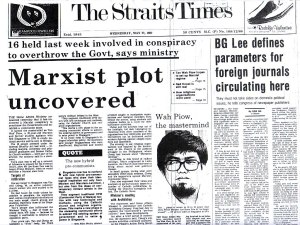Why Singaporeans need to discuss 1987’s Marxist Conspiracy

Do people become subversive after reading Animal Farm?
George Orwell’s allegory on totalitarianism was one piece of evidence Singapore’s Internal Security Department (ISD) allegedly seized in 1987 during Operation Spectrum. Thirty years on, the arrest and detention without trial of twenty-two people accused by the government of plotting a Marxist conspiracy to overthrow the state is still an episode shrouded in fog. There are good reasons today for society to embrace a more honest conversation about it.
The facts bear mention. On May 21st and June 20th 1987, a total of nine men and thirteen women, aged eighteen to forty, were arrested and detained by the ISD using powers conferred by Singapore’s Internal Security Act (ISA). The accused were a mix of activists, Catholic Church members, social workers and theatre performers. Some had ties to the rejuvenated Workers’ Party.
A week after the first arrests, the government released a statement tying them to a supposed plot masterminded by Tan Wah Piow, a Singaporean student activist who had gone into exile in London a decade earlier. All of the detained eventually gave written and/or video confessions.
By the end of 1987, all except Vincent Cheng, a church worker, had been released. On April 18th 1988, nine of the ex-detainees issued a statement recanting their confessions, saying they had been made under duress.
All but one, who was overseas, were rearrested the next day. They eventually reaffirmed their original statements and were again released. Two lawyers representing the detainees were also arrested, detained and later released. Cheng, the last detainee, was released in 1990.
Almost immediately doubts emerged about Operation Spectrum’s veracity. In 1991, Walter Woon, later to be Attorney-General, said “As far as I am concerned, the government’s case is still not proven. I would not say those fellows were Red, not from the stuff they presented.” In 1992, Minister S. Dhanabalan resigned from the Cabinet because of his discomfort with Operation Spectrum.
In 2001, Deputy Prime Minister Tharman Shanmugaratnam, personal friends with some of the accused, said “although I had no access to state intelligence, from what I knew of them, most were social activists but were not out to subvert the system.” Mary Turnbull, noted historian on Singapore, has called “the alleged Marxist conspiracy” a myth. (Source: C.M. Turnbull (2009). A History of Modern Singapore, 1819–2005.)
Despite this broad-based suspicion about what happened, the government has yet to conduct an inquiry. In 2011 the Ministry of Home Affairs reasserted its position that the twenty-two “were not detained for their political beliefs, but because they had involved themselves in subversive activities which posed a threat to national security.”
Many believe there is nothing to be gained from an inquiry into something that occurred thirty years ago. That is myopic. A nation cannot be built on collective amnesia. By conducting one, Singapore can finally ascertain the truth, strengthening societal cohesion, as well as public faith in its national security apparatus.
To understand why, it is worth first considering the allegations made by the detainees about their time in jail. Long reticent because of their fear of reprisals, some have in recent years started speaking out. Many claim they did not know each other before the arrests. The picture they paint of detention without trial, if true, is grim.
For the first seventy-two hours detainees claim they were made to stand barefoot in thin clothes while being interrogated in a tundra-like room by ISD officers wrapped in winter wear. Sleep deprived, the detainees started hallucinating.
Continue reading “Why Singaporeans need to discuss 1987’s Marxist Conspiracy”